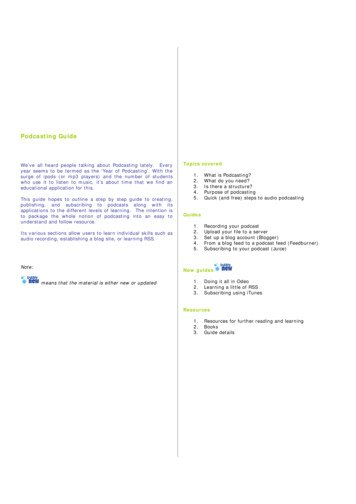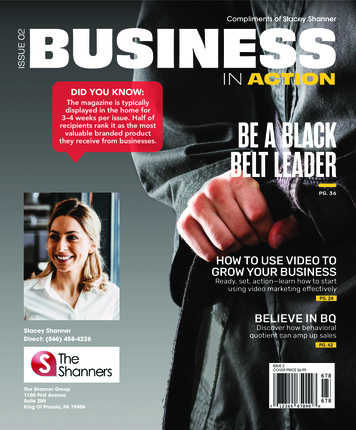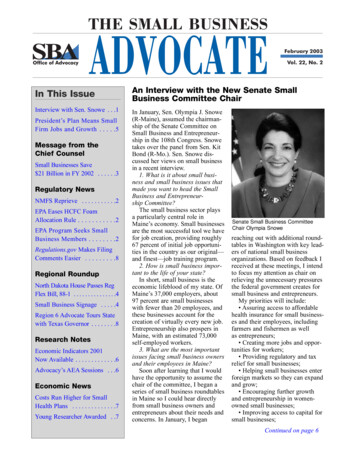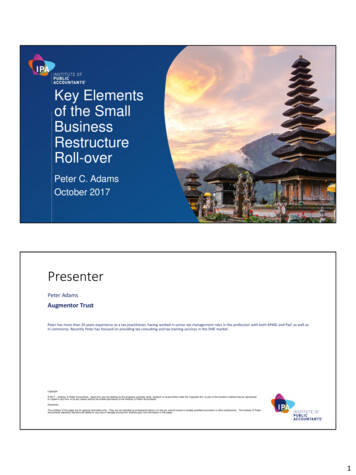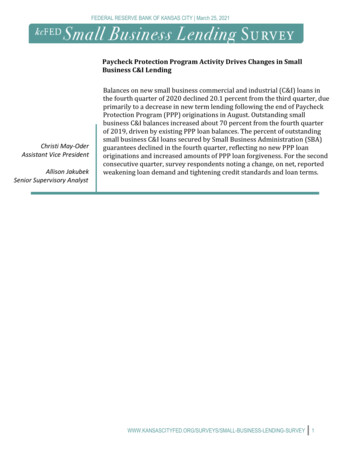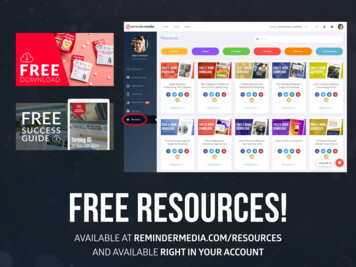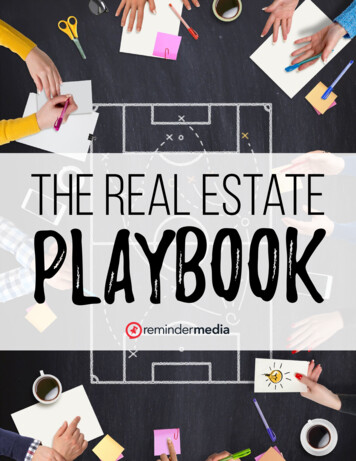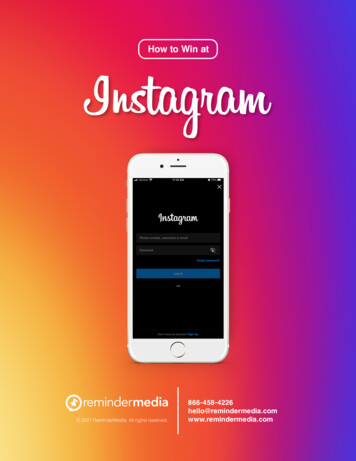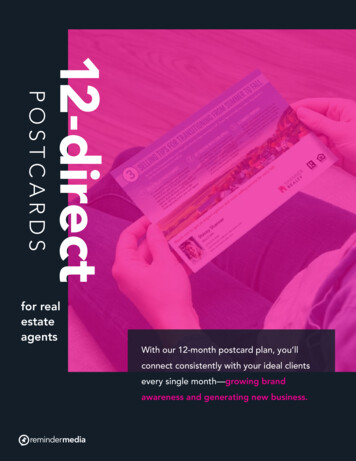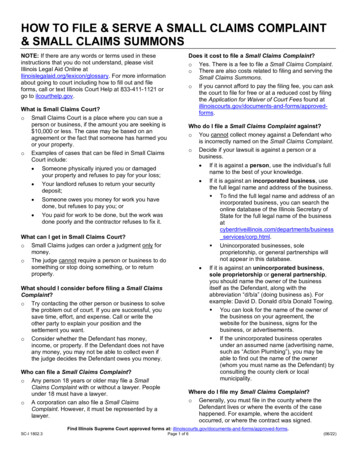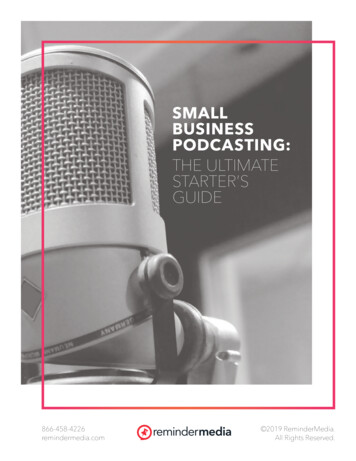
Transcription
SMALLBUSINESSPODCASTING:THE com 2019 ReminderMedia.All Rights Reserved.
INTRODUCTIONSo, you’re interested in starting your own podcast. There aremany reasons why launching a podcast is a great idea: Podcasts are a cost-effective content marketing solution. They’re great for networking with other businesses. It’s easier to start one than most people think.In this e-book, you’ll learn everything you need to know to createyour very own podcast—and, in turn, use it to grow your brand.1
THE BENEFITS OF PODCASTINGPodcasts are easy and inexpensive to produce, with manytangible benefits to your business.For one, since people tend to listen to podcasts while doingactivities such as commuting or exercising, you’ll have the captiveattention of your audience. Plus, having a podcast will positionyou as a subject matter authority. This is important, becausepeople buy from businesses they admire, believe in, and trust.Consider these statistics: 80% of podcast listeners listen to most or all of each episode. P odcast enthusiasts listen to more than 6 hours ofpodcasts a week, on average. T he average listener subscribes to at least 6 podcastsand listens to 7 different shows each week. 6 9% of listeners say a podcast has made them awareof a product or service.[Data compiled by Music Oomph and based on studies by Nielsen and Edison.]Simply put: podcast listeners are attentive and dedicated. They’re alsovery likely to walk away with increased awareness of your business.For a service-based salesperson in a small town, doing a podcast isa wise investment. Depending on the size of your community, youmight be the only person in your field hosting a podcast. This willgo a long way when your listeners have a need for what you sell.BOTTOM LINE: Your goal is to connect with the communityyou serve, and podcasts are a great way to build trust.2
WHAT YOU NEED TO GET STARTEDWhat’s required to produce your podcast depends on your budget andgoals. But the good news is that you can start a basic podcast with justtwo things:1. A recording device.2. A hosting device.Why do you need a hosting service? For one, hosting services makeit possible for people to download or stream your podcast.Your host also offers analytics (which lets you know how manypeople are tuning in) and makes it possible for you to submit yourshow to multiple podcasting platforms, such as Apple Podcasts,Google Play, and Spotify. From there, the sky is the limit! ASIC PODCAST STARTER KITBA smart phone.A pair of headphones.The Anchor app (records, uploads, and hosts your podcast).I NTERMEDIATE PODCAST KIT A pair of 20–30 microphones/comparable headphones.A computer and the Audacity program.Libsyn podcast hosting (tiered pricing, with many options). DVANCED PODCAST KITA 80–90 microphones/comparable headphones.A Mevo camera (allows automatic switchingbetween guests for a video podcast).BOTTOM LINE: The barrier to entry for podcasting isincredibly low! Don’t be afraid to start out small and stepthings up as your show starts to gain traction.3
WHAT SHOULD YOU TALK ABOUT?Podcasts are a great way to provide value, establish expertise, and drawin customers. That’s why there are currently more than 700,000 podcastsavailable for download.You can easily create your own podcast and use it to build yourbrand. The important thing is to just get started. Record a few episodesto get a feel for the process. In doing so, you’ll figure out how to offeryour audience content that is educational and entertaining. Then, gofrom there!If you’re unsure of which topics to talk about, feel free to use any of thefollowing ideas: Provide regular market updates. Discuss topics for retirees, first-time home buyers, etc. Share home improvement ideas. Interview movers and shakers in your community or industry. Talk about unique places in your community.BONUS IDEA: Host apodcast about your hobbiesor interests, and you’ll neverrun out of things to talkabout! When you do this, besure to tout your businessas the sponsor of the show.That way, you’ll make peopleaware of your brand whiledrawing in casual listeners.4
GETTING YOUR PODCAST OUT THEREAs we mentioned earlier, most podcast hosts will make it easy for you topost your episodes to the top podcasting platforms. Before you upload,there are a few things you’ll want to keep in mind that will help youconnect with your ideal audience.TITLEYour title should be descriptive while catching the attention of youraudience. Whichever industry you’re in, there will probably be a fairamount of other podcasts to compete with. That’s why you need toget creative.Come up with an engaging or entertaining name—maybe a playon words or on your name—but subtitle it to give audiences moreinformation about your show. For example, the full title of Stay Paid isStay Paid: A Sales and Marketing Podcast.Your title shouldbe descriptive whilecatching the attentionof your audience.5
GETTING YOUR PODCAST OUT THERECATEGORIESWhen you’re submitting your podcast to all the major platforms, you’llbe asked through your hosting service to specify a category (andpossibly a subcategory) for your show. If your podcast fits under multiplecategories, you have that option, too.For example, Libsyn allows you to select Category 1, Category 2,and Category 3. Let’s say you’re hosting a podcast about real estateinvestment but you also offer marketing and productivity tips. You canselect Business Investing as your primary category. You might thenselect Business Marketing and Business Entrepreneurship.When you’re choosing your categories, be honest about what you planto offer. If you’re trying to capture an audience interested in a topic youwon’t actually be discussing, they won’t stick around. On the other hand,the right combination of categories will help you connect with the rightaudience—listeners who are already browsing for resources on a subject(or subjects) you know a whole lot about.KEYWORDSConsider topics that your ideal audience would be interested in. Then,use those topics to identify potential keywords you could attach to yourpodcast. When your potential listeners/customers search for thosekeywords, you want your podcast to be in the mix.For example, if your podcast focuses on flipping houses, you could usekeywords like “real estate” and “investing.” If you’re focusing on localevents and resources in your community, be sure to include the name ofyour town and neighborhood.6
ADDING THE FINISHING TOUCHESIn addition to the proper equipment, hosting, and a topic,you’ll need a couple small bells and whistles, which willlend a sense of consistency to your production and makeit easier for listeners to find and remember you.(Don’t worry: these things are all very easy to getand, best of all, they’re affordable.)PODCAST ARTYou’ll need artwork for platforms such as iTunes and Spotify,as well as to promote your podcast on the web and socialmedia. Here are a few ways you can get a logo: Visit creative.remindermedia.com. Ask someone you know who is a graphic designer. Use a work-for-hire website like Fiverr.com.PRODUCTION MUSIC You’ll want to have music that can play at the beginningand end of each episode. Websites like AudioJungle andSoundstripe offer royalty-free music that you can license. If you find images or music that have a Creative Commons 0 license,you are free to use them anywhere, completely free of charge.SOCIAL MEDIA Be sure to promote your show on social media, both on yourpersonal pages and your business accounts. You might evenchoose to create dedicated accounts for your podcast.BOTTOM LINE: Have a professional presentation, and peoplewill take your podcast (and your business) more seriously.7
USING YOUR PODCAST TOGROW YOUR BRANDHere’s one thing you should know about hosting a business podcast:You’re extremely unlikely to get rich off the show itself.But, even if you don’t make a dime directly from your podcast, thenetworking opportunities, credibility, and content possibilities make itwell worth your investment.In order to get the absolute most out of your podcast, you shouldconsider using the same content in audio, video, and written formats.AUDIOMany podcast listeners love the portability of podcasts, and how they’reable to enjoy them while doing other things (such as commuting,cooking, or exercising). That’s why the standard audio version of yourpodcast will always be the most important medium.VIDEOIf podcasts are an audio medium, why should you worry about video?There are several reasons why you might want to also record a videoversion of your podcast: V ideo is discoverable on channels like YouTube, which expands yourreach significantly. Y ou’re looking to build trust, and the visual medium will help potentialclients get to know you better. Y ou can repurpose short video clips on social media and increasebrand awareness that way.8
USING YOUR PODCAST TOGROW YOUR BRANDWRITTENWhen you post transcripts of each podcast episode on your blog, you canbring in new listeners who find those posts through search engines. Youcan also embed the audio and/or video version of your podcast, whileencouraging visitors to subscribe.Most importantly, you’re driving valuable traffic to your website, which willultimately help increase sales.By making your podcast available on different platforms, you’re growingawareness of your brand and establishing credibility. You can buildon this even further by running ads for your show on social media orappearing on other podcasts to promote your own.Be sure to end each episode with a clear call-to-action, such as askingpeople to subscribe to your podcast, follow you on social media, or rateyour show on their podcast platform of choice.Starting to notice an uptick in episode downloads? Take advantage of thispublicity by promoting special offers for your business. Be sure to directlisteners/viewers/readers to special landing pages, so you can easilydetermine where those new customers come from.At the end of the day, your podcast is a branding play. Take action today,and you’ll see the power it brings to your business over time.9
CONCLUSIONRemember: your brand is your money. Podcasts make youappear significant and omnipresent. This builds authority, whichgets you in the position where someone will buy from you. Plus,it’s never been easier to get started.Now that you know the basics of podcasting, don’t just sit onthat knowledge—get out there and start recording! You’ll beglad you did.Want more actionable advice that will helptake your business to the next level? Check outour weekly sales and marketing podcast, StayPaid. Visit staypaidpodcast.com, subscribe onyour favorite podcast platform, and follow uson Instagram: @staypaidpodcast.10
of a product or service. [Data compiled by Music Oomph and based on studies by Nielsen and Edison.] Simply put: podcast listeners are attentive and dedicated. They're also very likely to walk away with increased awareness of your business. For a service-based salesperson in a small town, doing a podcast is a wise investment.
